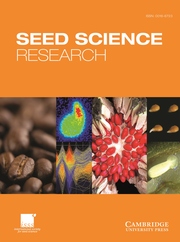Crossref Citations
This article has been cited by the following publications. This list is generated based on data provided by
Crossref.
Yildiz, Mustafa
., Hakan Terzi
and
., Evrim Suna Arikan
2006.
Seed Germination of Populations of Wild Wheat Species, Aegilops biuncialis and Ae. triuncialis: Effects of Salinity, Temperature and Photoperiod.
Pakistan Journal of Biological Sciences,
Vol. 9,
Issue. 7,
p.
1299.
Wesche, K.
Pietsch, M.
Ronnenberg, K.
Undrakh, R.
and
Hensen, I.
2006.
Germination of fresh and frost-treated seeds from dry Central Asian steppes.
Seed Science Research,
Vol. 16,
Issue. 2,
p.
123.
Cortez-Bah, Elvira
Cruz-Ferna, Felix
Hernandez-, Maria I.
Peraza-Lun, Fernando
Aguado-San, Gerardo A.
Serratos-A, Juan C.
Ponce, Pedro Posos
Gonzalez-C, Mario M.
Torres-Pac, Irineo
Guevara-Ol, Lorenzo
and
Guevara-Go, Ramon Gerardo
2007.
A New Lea Gene is Induced During Osmopriming of Capsicum annuum L. Seeds.
International Journal of Botany,
Vol. 4,
Issue. 1,
p.
77.
Shaikh, Faiza
Gul, Bilquees
Li, Wei-qiang
Liu, Xiao-jing
and
Khan, M. Ajmal
2007.
Effect of calcium and light on the germination of Urochondra setulosa under different salts.
Journal of Zhejiang University SCIENCE B,
Vol. 8,
Issue. 1,
p.
20.
Song, Jie
Fan, Hai
Zhao, Yuanyuan
Jia, Yonghui
Du, Xihua
and
Wang, Baoshan
2008.
Effect of salinity on germination, seedling emergence, seedling growth and ion accumulation of a euhalophyte Suaeda salsa in an intertidal zone and on saline inland.
Aquatic Botany,
Vol. 88,
Issue. 4,
p.
331.
Collins, R. P.
Harris, P. J. C.
Bateman, M. J.
and
Henderson, J.
2008.
Effect of Calcium and Potassium Nutrition on Yield, Ion Content, and Salt Tolerance of Brassica campestris (rapa).
Journal of Plant Nutrition,
Vol. 31,
Issue. 8,
p.
1461.
Sousa, Marcílio Pereira
Braga, Lúcia Filgueiras
Braga, João Filgueiras
and
Delachiave, Maria Elena Aparecida
2008.
Estresses hídrico e salino no processo germinativo das sementes de Plantago ovata Forsk. (Plantaginaceae).
Revista Árvore,
Vol. 32,
Issue. 1,
p.
33.
Mokhberdor, F.
Kalat, S.M. Nabavi
and
Haghighi, R. Sadrabadi
2009.
Effect of Temperature, Iso-Osmotic Concentrations of NaCl and PEG Agents on Germination and Some Seedling Growth Yield Components in Rice (Oryza sativa L.).
Asian Journal of Plant Sciences,
Vol. 8,
Issue. 6,
p.
409.
Ghars, Mohamed Ali
Debez, Ahmed
and
Abdelly, Chedly
2009.
Interaction between Salinity and Original Habitat during Germination of the Annual Seashore HalophyteCakile Maritima.
Communications in Soil Science and Plant Analysis,
Vol. 40,
Issue. 19-20,
p.
3170.
Li, R.
Shi, F.
and
Fukuda, K.
2010.
Interactive effects of salt and alkali stresses on seed germination, germination recovery, and seedling growth of a halophyte Spartina alterniflora (Poaceae).
South African Journal of Botany,
Vol. 76,
Issue. 2,
p.
380.
Orlovsky, N.S.
Japakova, U.N.
Shulgina, I.
and
Volis, S.
2011.
Comparative study of seed germination and growth of Kochia prostrata and Kochia scoparia (Chenopodiaceae) under salinity.
Journal of Arid Environments,
Vol. 75,
Issue. 6,
p.
532.
Li, Xin
Zhang, Xiaodong
Song, Jie
Fan, Hai
Feng, Gu
and
Wang, Baoshan
2011.
Accumulation of ions during seed development under controlled saline conditions of two Suaeda salsa populations is related to their adaptation to saline environments.
Plant and Soil,
Vol. 341,
Issue. 1-2,
p.
99.
Atia, A.
Smaoui, A.
Barhoumi, Z.
Abdelly, C.
and
Debez, A.
2011.
Differential response to salinity and water deficit stress in Polypogon monspeliensis (L.) Desf. provenances during germination.
Plant Biology,
Vol. 13,
Issue. 3,
p.
541.
Gupta, Sanjay Mohan
Pandey, Pankaj
Grover, Atul
and
Ahmed, Zakwan
2011.
Breaking seed dormancy in Hippophae salicifolia, a high value medicinal plant.
Physiology and Molecular Biology of Plants,
Vol. 17,
Issue. 4,
p.
403.
Li, X.
Liu, Y.
Chen, M.
Song, Y. P.
Song, J.
Wang, B. S.
and
Feng, G.
2012.
Relationships between ion and chlorophyll accumulation in seeds and adaptation to saline environments in Suaeda salsa populations.
Plant Biosystems - An International Journal Dealing with all Aspects of Plant Biology,
Vol. 146,
Issue. sup1,
p.
142.
Breckle, S-W.
and
Wucherer, W.
2012.
Aralkum - a Man-Made Desert.
Vol. 218,
Issue. ,
p.
271.
Marques, I.
and
Draper, D.
2012.
Seed germination and longevity of autumn-flowering and autumn-seed producing Mediterranean geophytes.
Seed Science Research,
Vol. 22,
Issue. 4,
p.
299.
Atia, Abdallah
Debez, Ahmed
Barhoumi, Zouhaier
Abdelly, Chedly
and
Smaoui, Abderrazak
2012.
Investigation of embryo growth and reserve mobilization of water or salt imbibed seeds ofCrithmum maritimumL..
Acta Botanica Gallica,
Vol. 159,
Issue. 1,
p.
17.
Zehra, A.
Gul, B.
Ansari, R.
and
Khan, M.A.
2012.
Role of calcium in alleviating effect of salinity on germination of Phragmites karka seeds.
South African Journal of Botany,
Vol. 78,
Issue. ,
p.
122.
Wang, Yan
Jiang, Gang Qiang
Han, Yin Nan
and
Liu, Meng Meng
2013.
Effects of salt, alkali and salt–alkali mixed stresses on seed germination of the halophyte Salsola ferganica (Chenopodiaceae).
Acta Ecologica Sinica,
Vol. 33,
Issue. 6,
p.
354.


